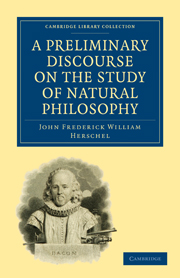Book contents
- Frontmatter
- Contents
- Dedication
- PART I OF THE GENERAL NATURE AND ADVANTAGES OF THE STUDY OF THE PHYSICAL SCIENCES
- CHAP. I Of Man regarded as a Creature of Instinct, of Reason, and Speculation. — General Influence of Scientific Pursuits on the Mind
- CHAP. II Of abstract Science as a Preparation for the Study of Physics. — A profound Acquaintance with it not indispensable for a clear Understanding of Physical Laws. — How a Conviction of their Truth may be obtained without it. — Instances. — Further Division of the Subject
- CHAP. III Of the Nature and Objects, immediate and collateral, of Physical Science, as regarded in itself, and in its Application to the practical Purposes of Life, and its Influence on the Well-being and Progress of Society
- PART II OF THE PRINCIPLES ON WHICH PHYSICAL SCIENCE RELIES FOR ITS SUCCESSFUL PROSECUTION, AND THE RULES BY WHICH A SYSTEMATIC EXAMINATION OF NATURE SHOULD BE CONDUCTED, WITH ILLUSTRATIONS OF THEIR INFLUENCE AS EXEMPLIFIED IN THE HISTORY OF ITS PROGRESS
- PART III OF THE SUBDIVISION OF PHYSICS INTO DISTINCT BRANCHES, AND THEIR MUTUAL RELATIONS
- Index
CHAP. III - Of the Nature and Objects, immediate and collateral, of Physical Science, as regarded in itself, and in its Application to the practical Purposes of Life, and its Influence on the Well-being and Progress of Society
Published online by Cambridge University Press: 29 August 2010
- Frontmatter
- Contents
- Dedication
- PART I OF THE GENERAL NATURE AND ADVANTAGES OF THE STUDY OF THE PHYSICAL SCIENCES
- CHAP. I Of Man regarded as a Creature of Instinct, of Reason, and Speculation. — General Influence of Scientific Pursuits on the Mind
- CHAP. II Of abstract Science as a Preparation for the Study of Physics. — A profound Acquaintance with it not indispensable for a clear Understanding of Physical Laws. — How a Conviction of their Truth may be obtained without it. — Instances. — Further Division of the Subject
- CHAP. III Of the Nature and Objects, immediate and collateral, of Physical Science, as regarded in itself, and in its Application to the practical Purposes of Life, and its Influence on the Well-being and Progress of Society
- PART II OF THE PRINCIPLES ON WHICH PHYSICAL SCIENCE RELIES FOR ITS SUCCESSFUL PROSECUTION, AND THE RULES BY WHICH A SYSTEMATIC EXAMINATION OF NATURE SHOULD BE CONDUCTED, WITH ILLUSTRATIONS OF THEIR INFLUENCE AS EXEMPLIFIED IN THE HISTORY OF ITS PROGRESS
- PART III OF THE SUBDIVISION OF PHYSICS INTO DISTINCT BRANCHES, AND THEIR MUTUAL RELATIONS
- Index
Summary
(26.) The first thing impressed on us from our earliest infancy is, that events do not succeed one another at random, but with a certain degree of order, regularity, and connection; — some constantly, and, as we are apt to think, immutably, — as the alternation of day and night, summer and winter, — others contingently, as the motion of a body from its place, if pushed, or the burning of a stick if thrust into the fire. The knowledge that the former class of events has gone on, uninterruptedly, for ages beyond all memory, impresses us with a strong expectation that it will continue to do so in the same manner; and thus our notion of an order of nature is originated and confirmed. If every thing were equally regular and periodical, and the succession of events liable to no change depending on our own will, it may be doubted whether we should ever think of looking for causes. No one regards the night as the cause of the day, or the day of night. They are alternate effects of a common cause, which their regular succession alone gives us no sufficient clue for determining. It is chiefly, perhaps entirely, from the other or contingent class of events that we gain our notions of cause and effect. From them alone we gather that there are such things as laws of nature.
Information
- Type
- Chapter
- Information
- Publisher: Cambridge University PressPrint publication year: 2009First published in: 1830
